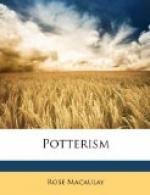One didn’t know what had happened, or what was happening, or what was going to happen. We had won the war. But what was that going to mean? What were we going to get out of it? What did we want the new world to be? What did we want this country to be? Every one shouted a different answer. The December elections seemed to give one answer. But I don’t think it was a true one. The public didn’t really want the England of John Bull and Pemberton Billing; they showed that later.
A good many people, of course, wanted and want revolution and the International. I don’t, and never did. I hate red-flaggery, and all other flaggery. The sentimentalism of Bob Smillie is as bad as the sentimentalism of the Pinkerton press; as untruthful, as greedy, as muddle-headed. Smillie’s lot are out to get, and the Potterites out to keep. The under-dog is more excusable in its aims, but its methods aren’t any more attractive. Juke can swallow it all. But Jukie has let his naturally clear head get muddled by a mediaeval form of religion. Religion is like love; it plays the devil with clear thinking. Juke pretended not to hate even Smillie’s interview with the coal dukes. He applauded when Smillie quoted texts at them. Though I know, of course, that that sort of thing is mainly a pose on Juke’s part, because it amuses him. Besides, one of the dukes was a cousin of his, who bored him, so of course he was pleased.
But those texts damned Smillie for ever in my eyes. He had those poor imbeciles at his mercy—and he gave his whole case away by quoting irrelevant remarks from ancient Hebrew writers. I wish I had had his chance for ten minutes; I would have taken it. But the Labour people are always giving themselves away with both hands to the enemy. I suppose facts have hit them too hard, and so they shrink away from them—pad them with sentiment, like uneducated women in villas. They all need—so do the women—a legal training, to make their minds hard and clear and sharp. So do journalists. Nearly the whole press is the same, dealing in emotions and stunts, unable to face facts squarely, in a calm spirit.
It seemed to some of us that spring that there was a chance for unsentimental journalism in a new paper, that should be unhampered by tradition. That was why the Weekly Fact (unofficially called the Anti-Potterite) was started. All the other papers had traditions; their past principles dictated their future policy. The Fact (except that it was up against Potterism) was untrammelled; it was to judge of each issue as it turned up, on its own merits, in the light of fact. That, of course, was in itself the very essence of anti-Potterism, which was incapable of judging or considering anything whatever, and whose only light was a feeble emotionalism The light of fact was to Potterites but a worse darkness.




